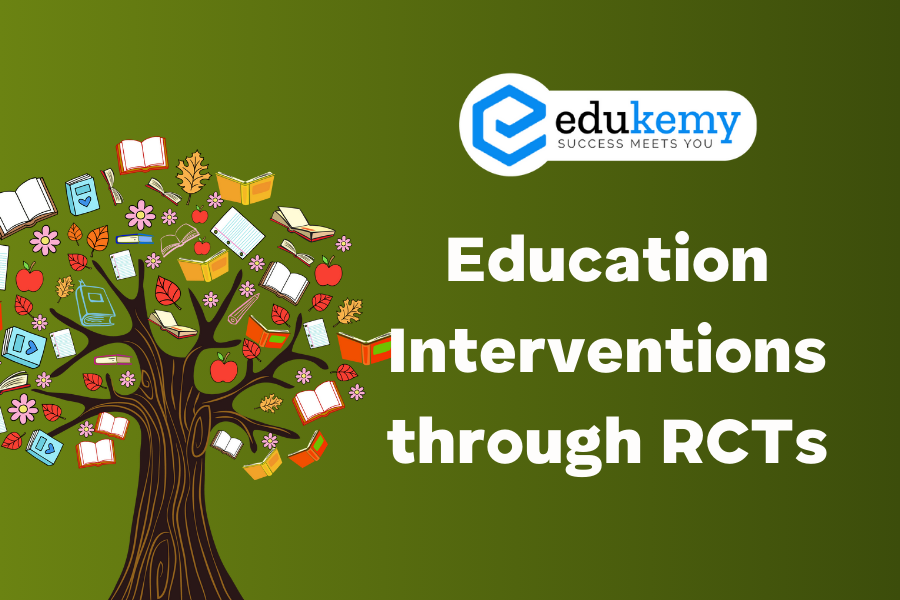
Education interventions are crucial in shaping the trajectory of individuals and societies, yet determining their effectiveness often poses a challenge. Rigorous evaluation methods are essential to identify interventions that truly make a difference in educational outcomes. Randomized controlled trials (RCTs) stand as a gold standard in this pursuit, offering a robust framework for assessing the impact of educational interventions with precision and reliability. By randomly assigning participants to treatment and control groups, RCTs enable researchers to isolate the causal effects of specific interventions, shedding light on what works and what doesn’t in the realm of education. Through meticulous design and analysis, RCTs provide valuable insights that inform evidence-based policymaking and practice, ultimately striving towards enhancing educational opportunities and outcomes for all.
Contents
- 1 Education Interventions through RCTs:
- 2 Conclusion:
- 3 FAQs
- 3.1 1. What are RCTs in the context of education interventions?
- 3.2 2. How do RCTs contribute to improving educational outcomes?
- 3.3 3. What types of education interventions are commonly evaluated through RCTs?
- 3.4 4. What are some challenges associated with conducting RCTs in education?
- 3.5 5. How can educators and policymakers use findings from RCTs to inform decision-making?
- 4 In case you still have your doubts, contact us on 9811333901.
Education Interventions through RCTs:
1. Adapting Teaching to Pupils’ Needs:
- RCTs have been instrumental in identifying interventions that enhance educational outcomes at minimal cost.
- Studies conducted by Banerjee, Duflo, and others focused on remedial tutoring programs in two Indian cities, Mumbai and Vadodara.
- New teaching assistants were introduced, providing support to children with special needs.
- Randomized placement of schools into different groups allowed for credible measurement of the effects of teaching assistants.
- Results demonstrated that targeted assistance for the weakest pupils was effective in the short and medium term.
2. Addressing Teacher Absenteeism and Motivation:
- Field experiments delved into the issue of teacher absenteeism, uncovering the lack of clear incentives and accountability.
- To boost teacher motivation, short-term contracts were introduced, extendable based on performance.
- A comparison was made between the effects of employing teachers on short-term contracts and reducing the pupil-teacher ratio by having fewer pupils per permanently employed teacher.
- Findings revealed that pupils with teachers on short-term contracts exhibited significantly better test results, while reducing the pupil-teacher ratio had no significant effects.
3. Insights from Experimental Research:
- Experimental research in education in low-income countries emphasizes the value of reforms that tailor teaching to the specific needs of pupils.
- The studies underscore the importance of adapting educational strategies to the context, moving beyond resource limitations.
- Clear incentives, accountability measures, and targeted interventions for weaker students have proven to be effective in improving educational outcomes.
4. Cost-Effective Measures:
- Improving school governance and demanding accountability from teachers who underperform have been identified as cost-effective measures.
- By focusing on these aspects, educational reforms can be implemented efficiently, leading to positive outcomes.
Conclusion:
- RCT-based field experiments have significantly contributed to understanding the dynamics of education in low-income countries.
- The findings highlight the efficacy of interventions that prioritize student needs, address teacher absenteeism, and implement governance reforms.
- These insights offer practical and cost-effective measures for enhancing educational outcomes in resource-constrained settings.
FAQs
1. What are RCTs in the context of education interventions?
- Randomized Controlled Trials (RCTs) are rigorous research designs where participants are randomly assigned to either an intervention group or a control group. In education, RCTs are used to evaluate the effectiveness of specific interventions, such as teaching methods, curriculum changes, or educational technologies.
2. How do RCTs contribute to improving educational outcomes?
- RCTs provide reliable evidence on the effectiveness of educational interventions by comparing outcomes between intervention and control groups. This allows educators and policymakers to make informed decisions about which interventions are most likely to improve student learning and achievement.
3. What types of education interventions are commonly evaluated through RCTs?
- Various interventions can be evaluated through RCTs, including tutoring programs, early childhood interventions, classroom management strategies, technology-based learning platforms, and curriculum modifications. RCTs help determine the impact of these interventions on factors like academic performance, attendance rates, and socio-emotional development.
4. What are some challenges associated with conducting RCTs in education?
- Challenges include obtaining ethical approval for random assignment, ensuring sufficient sample sizes for meaningful results, accounting for potential confounding variables, and addressing issues related to implementation fidelity. Additionally, long-term follow-up may be necessary to assess the sustained impact of interventions.
5. How can educators and policymakers use findings from RCTs to inform decision-making?
- Educators and policymakers can use RCT findings to allocate resources more effectively, prioritize interventions that have demonstrated effectiveness, and tailor strategies to meet the specific needs of students and schools. By integrating evidence-based practices into educational policies and programs, stakeholders can work towards improving overall educational outcomes.
In case you still have your doubts, contact us on 9811333901.
For UPSC Prelims Resources, Click here
For Daily Updates and Study Material:
Join our Telegram Channel – Edukemy for IAS
- 1. Learn through Videos – here
- 2. Be Exam Ready by Practicing Daily MCQs – here
- 3. Daily Newsletter – Get all your Current Affairs Covered – here
- 4. Mains Answer Writing Practice – here

